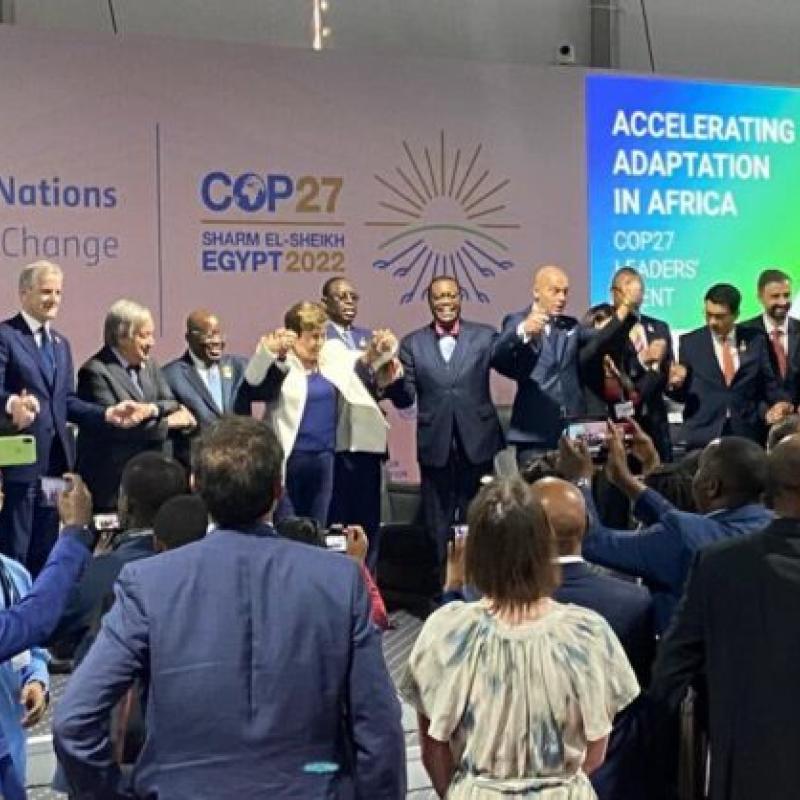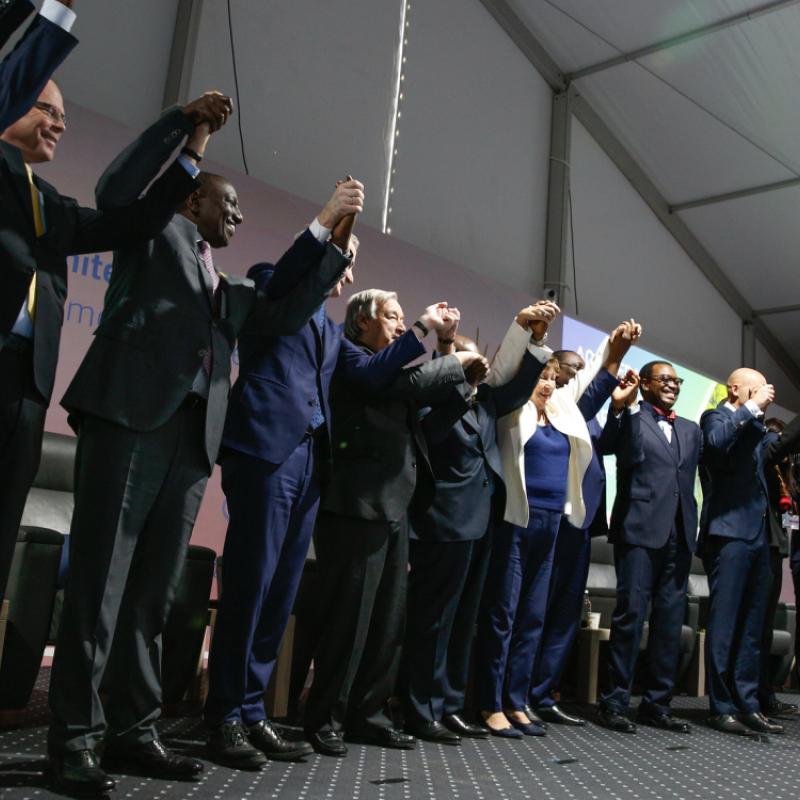
AAAP in the Media
Displaying 1 - 12 of 12
Experts share lessons learned on gender-responsive climate action during Commonwealth NDC webinar
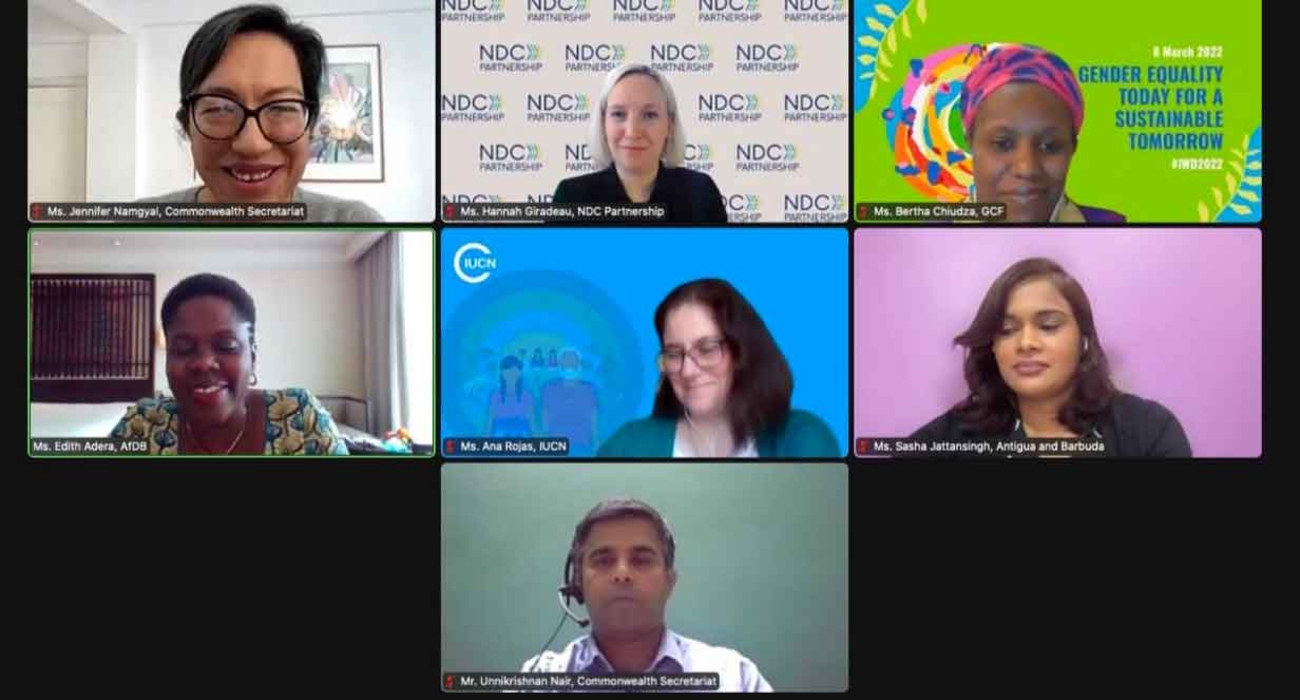
This year, Edith Ofwona Adera, Coordinator of the Africa Adaptation Acceleration Program (AAAP) and the African Development Bank’s Regional Principal Officer for Climate Change and Green Growth, marked International Women’s Day in a special way.
Adera took part in a panel discussion organised by the Commonwealth Secretariat, reflecting this year’s theme: Gender equality today for a sustainable tomorrow.
The panel, hosted by Jennifer Namgyal of the Commonwealth Secretariat, brought together experts who shared their experiences and lessons learned on integrating gender equality in Nationally Determined Contributions, or NDCs, across their respective regions and institutions. NDCs are national plans highlighting climate actions, including targets, policies and measures that governments aim to implement.
Hannah Girardeau, of the NDC Partnership Support Unit, kicked off the session with a presentation on the findings of an analysis of gender considerations in revised NDCs of the partnership’s member countries. The assessment revealed that more countries had now included the fundamental building blocks of gender-responsive climate action in their policies and plans. Girardeau noted that there is a need to invest in other critical elements such as conducting gender analyses, developing indicators, and establishing gender-responsive budgets to complement progress achieved.
Adera agreed with her. “As climate change impacts affect people differently, the responses need to be differentiated, based on identified unique needs, informed by disaggregated data,” Adera added.
To address this challenge, the African Development Bank is supporting national statistical systems in five countries through a Capacity Building for Gender Statistics and Monitoring Systems project. The project aims to produce quality, comparable and regular gender statistics to address national data gaps, strengthen monitoring systems, and integrate gender indicators across sectors.
Bertha Chiudza of the Green Climate Fund said a key requirement for all its financed activities is to ensure gender considerations are included in the development of action plans and assessments. “For its support on Nationally Determined Contributions, the Green Climate Fund ensures that gender considerations are brought in from planning and design, implementation and reporting across the sectors prioritized by countries, while ensuring inclusive stakeholder consultations,” Chiudza stated.
Sasha Jattansingh, the Commonwealth Climate Finance Adviser, gave insights into Antigua and Barbuda’s actions to mainstream gender equality into Nationally Determined Contributions. The country recognized equity issues and committed to a just energy transition with a strong focus on gender, Jattansingh noted. Antigua and Barbuda is an example of a country that has made progress in developing an inclusive renewable energy strategy that promotes socially inclusive, gender-responsive, and accessible investment opportunities.
Anna Rojas of the International Union for Conservation of Nature also shared her experiences and lessons in integrating gender into Nationally Determined Contributions, pointing out that biodiversity issues are now being integrated more consistently in these plans. She called for local-level conversations with women to tap into their strengths and rich knowledge. “Engagement with women will avoid dismal adaptation because, the more we identify needs, strengths, and solutions, the better we will be prepared,” she emphasized.
The African Development Bank is rolling out a detailed analysis of climate-gender hotspots in Rwanda. Adera said it would highlight real gender gaps and deep vulnerabilities, and how best climate interventions can address these gender issues.
Finance also emerged as one of the vital tools to promote gender equality in Nationally Determined Contributions. Innovative financial instruments and solutions must come into play when addressing gender inequalities for climate change interventions, noted Unnikrishnan Nair of the Commonwealth Secretariat.
African Youth Adaptation Solutions Challenge – Cycle 1
Through the African Youth Adaptation Solutions (YouthADAPT) Challenge, the AAAP aims to inspire and support the commercialisation of climate change adaptation solutions, driven by African youth entrepreneurs. The YouthADAPT Challenge is open to solutions (products, services, tools, or ideas) targeted at climate change adaptation and increasing resilience.
Admissible solutions can represent:
- An adaptation solutions business that has not been scaled and is not in widespread use
- An existing resilience and adaptation solutions business or product
- A commercially viable means to raise awareness or scale uptake of specific adaptation solutions.
Applicants must be 18–35 years old and registered and operating in Africa. Their venture must be youth-led while delivering climate adaptation or resilience solutions addressing a real-life challenge. 50% of the finalists will be women-owned or women-led enterprises. Winners will receive a business grant of up to $100,000 and the opportunity to further develop their ventures through business support and acceleration.
The Cycle 1 (2021) winners were unveiled at COP26 in Glasgow, United Kingdom, in a ceremony held at the Africa Pavilion. They include Mumita Holdings Limited, Cameroon, Salubata Technological Innovations Limited, Nigeria, Sustainable Builders, Zambia, Global Farms and Trading Company Limited, Ghana, Miama General Dealers Limited, Zambia, Kimplanter Seedling and Nurseries Limited, Kenya, Irri Hub Ke Limited, Kenya, Soupah Farm en- Market Limited, Nigeria, Simkay Green Global Ventures, Nigeria and Bleaglee Waste Management Limited, Cameroon.
The YouthADAPT Challenge aims to support youth-led enterprises to accelerate and scale-up innovative solutions for climate adaptation and resilience that will also lead to decent jobs for youth. The solutions target key environmental, social, and economic sectors affected by climate change, with a clear value proposition to scale up for greater impact and to create specified direct jobs.
The Challenge aims to strengthen inclusive growth and broaden investment and economic opportunities for youth in Africa through entrepreneurial skills development by providing training, mentorship, and financing to youth-led businesses (50% women-owned). The first edition of the awards was launched on 06 September 2021.
- Provide a financial contribution to cover the cost of program implementation and 50% of grant funding
- Participate in project missions and field visits to review progress with select beneficiary enterprises
- Support the project team to provide clarity on climate change adaptation and resilience in the training component, including tracking the creation of adaptation jobs
- Coordinate project monitoring and evaluation.
- The most innovative youth-owned enterprises on the continent are scaled up
- The viability of selected businesses is improved, to help sustain their impact on climate change adaptation
- Inclusiveness promoted through 50% of the selected businesses being led by women.
- Young innovators and MSMEs equipped with customised business development skills and resources;
- The short-term growth of youth-owned enterprises supported, with links to private equity and loan products for longer term growth.
- Expansion of partnership, knowledge sharing, exchange and learning created through a network of youth entrepreneurs in Africa.
- Inclusive growth, investment and economic opportunities for youth are strengthened through entrepreneurial skills development;
- Adaptation, innovation and jobs integrated and for jobs;
USD 1,000,000
Insurance Technical Support to Africa Adaptation Acceleration Programme (AAAP)
Countries in the Horn of Africa (HoA) are vulnerable to climatic shocks and their impact can have a devastating effect on agricultural production. The most vulnerable regions are arid and semi-arid areas that receive low rainfall and depend on pastoralism as the main economic activity. Elevated levels of food insecurity and conflict resulting from increased competition for pasture and water among pastoral communities is a concern for governments of HoA countries.
Strategies for increasing resilience need to be customized to different sub-regions and microclimates. Initiated in 2019, The Horn of Africa Initiative brings together 6 countries – Djibouti, Kenya, Ethiopia, Eritrea, Somalia and Sudan – to deepen economic integration and promote regional cooperation. The countries agreed that regional cooperation and economic integration should remain key to the overall recovery efforts of the sub-region.
The project described here focused on “Identifying Climate-Smart Digital Opportunities with Scaling Potential under the Horn of Africa Initiative”.
The findings in this report will contribute towards achieving the objectives of the HoA programme, which include:
-
Strengthening the resilience of pastoral and agro-pastoral production systems to climate change
-
Enhancing agribusiness and enterprise across value chains
-
Strengthening climate services and applications for enhanced adaptive capacity
This report was intended to contribute to the project design by ensuring that activities supporting investments under the HoA programme maximize complementarity around the application of digital technology to ensure efficiency, quality and real-time exchange of data, advisories and related services.
The report was also designed to produce a number of recommendations towards the identification of climate-smart digital opportunities; for example, the importance of establishing strong coordination mechanisms to implement digital solutions at a regional scale.
An in-depth understanding of the existing climate-smart digital opportunities with scaling potential under the HoA Initiative, including (but not limited to):
-
Emerging insurance innovations
-
Mainstreaming digital solutions to climate risk finance into country programmes
-
Application of digital technology to solve challenges in delivering agricultural insurance
-
Critical success factors for a successful regional drought insurance scheme
The output of this report advances the objectives of the Africa Adaptation Acceleration Programme (AAAP) of GCA and the African Development Bank, which was developed to help implement the vision of the Africa Union’s Adaptation Initiative. To accelerate adaptation, the AAAP will use a triple-win approach and implement climate resilience activities that address COVID-19, climate change and the economy. AAAP intends to mobilize over US$25 billion to support adaptation between 2020–2025.
N/A
Inclusive Insurance for Smallholder Farmers in Africa
Rising average temperatures, longer heat waves, more extreme precipitation events and locust invasions are just some of the adverse effects of climate change that will impact agriculture in Africa. Climate change is expected to cause a decrease in crop productivity due to increased heat and drought. Some crops are likely to be particularly at risk, such as cotton in Côte d'Ivoire or Ghana. This phenomenon will directly impact the population, with greater consequences for the most vulnerable famers.
In the face of rising climate risk across Africa, insurance is a key adaptation measure to strengthen food security and ensure climate resilience. However, the agricultural insurance market is nascent, particularly in sub-Saharan Africa, where less than 3% of farmers are protected.
The underdevelopment of agricultural insurance in Africa is due to a variety of factors, including the lack of organization in local value chains, the low profitability potential of programmes, and a general lack of financial resources and knowledge about insurance. Also, farmers do not consider agricultural insurance to be a priority.
The key aim of the landscape study on Inclusive Insurance for Smallholder Farmers in Africa was to clarify the pathway for the Global Center on Adaptation (GCA) to enter the agriculture insurance market in Africa. The study will contribute to defining the insurance toolkit included in the Smallholder Adaptation Accelerator (SAA) from the Climate Smart Digital Agriculture Pillar of the Africa Adaptation Acceleration Program (AAAP), a joint programme in cooperation with the African Development Bank (AfDB).
The landscape study, completed in December 2021, describes the current state of the agricultural insurance market in Africa and considers (i) the various approaches available to scale up agricultural insurance; (ii) the types of insurance product that could be created; (iii) whether insurance premiums should be subsidized; and (iv) how digital technologies and effective relationships with local partners could be leveraged to facilitate product design and distribution.
This landscape study aimed to achieve:
- A synthesis of market knowledge, including key trends in the African insurance market and the challenges to development of the market
- In-depth product knowledge, including of parametric insurance and digital innovations
- An understanding of the various potential insurance schemes and an awareness of the challenges in distribution
- A clear set of recommendations for the creation of an insurance product for smallholder farmers.
The outcomes of this landscape study should contribute to:
- The identification of priority countries to launch a pilot for a smallholder insurance product.
- The involvement of GCA either as a partner in an existing programme insuring smallholders in a country in sub-Saharan Africa, where the population is connected and digitally active, with a stable government willing to support an insurance programme; or as the catalyst for a new agricultural parametric insurance programme.
- The initiation of a four-step workplan: (i) a feasibility study; (ii) a business agreement; (iii) product design and validation; and (iv) enrolment of farmers into the scheme.
- Once established, the evolution of the insurance cover and type of product over time; for example, from drought index insurance for maize, to a hybrid product for maize, to a hybrid product for maize and cassava.
100000
African Youth Adaptation Solutions Challenge – Cycle 2
YouthADAPT is an annual competition that invites young entrepreneurs and micro, small, and medium enterprises in Africa to submit innovative solutions and business ideas that have the potential to drive climate change adaptation and resilience across the continent.
Through YouthADAPT, the AAAP aims to inspire and support the commercialisation of climate change adaptation solutions, driven by African youth entrepreneurs. The YouthADAPT Challenge is open to solutions targeted at climate change adaptation and increasing resilience.
Solutions can represent:
- An adaptation solutions business that has not been scaled and is not in widespread use
- An existing resilience and adaptation solutions business or product
- A commercially viable means to raise awareness or scale uptake of specific adaptation solutions.
The second edition of the African Youth Adaptation Solutions (YouthADAPT) Challenge was launched in September 2022. Winners will receive a business grant of up to $100,000 and the opportunity to further develop their ventures through business support and acceleration.
The YouthADAPT Challenge aims to support youth-led enterprises to accelerate and scale-up innovative solutions for climate adaptation and resilience. The solutions target key environmental, social, and economic sectors affected by climate change, with a clear value proposition to scale up for greater impact and to create specified direct jobs.
YouthADAPT aims to strengthen inclusive growth and broaden investment and economic opportunities for youth in Africa through entrepreneurial skills development by providing training, mentorship, and financing to youth-led businesses (50% women-owned). The first edition of the awards was launched on 06 September 2021.
- Provide a financial contribution to cover the cost of program implementation and 50% of grant funding
- Participate in project missions and field visits to review progress with select beneficiary enterprises
- Support the project team to provide clarity on climate change adaptation and resilience in the training component, including tracking the creation of adaptation jobs
- Coordinate project monitoring and evaluation.
- The most innovative youth-owned enterprises on the continent are scaled up
- The viability of selected businesses is improved, to help sustain their impact on climate change adaptation
- 50% of the selected businesses are led by women.
- Young innovators and MSMEs equipped with customised business development skills and resources.
- The short-term growth of youth-owned enterprises is supported, with links to private equity and loan products for longer term growth.
- Expansion of partnership, knowledge sharing, exchange and learning through a network of youth entrepreneurs in Africa.
- Inclusive growth, investment and economic opportunities for youth;
- Adaptation, innovation and jobs integrated and for jobs;
Total: USD 1,400,000
Budget for Knowledge Partner (Project Implementation Cost) - USD 400,000
Grant Awards (50% of total grant awards) – USD 1,000,000
2022 Disbursement:
60% Disbursement of Project Implementation Cost to Knowledge Partner – USD 240,000
50% of Grant Awards – USD 500,000
Global Leaders Rally Support and Finance for the Africa Adaptation Acceleration Program to Tackle Climate Change in Africa
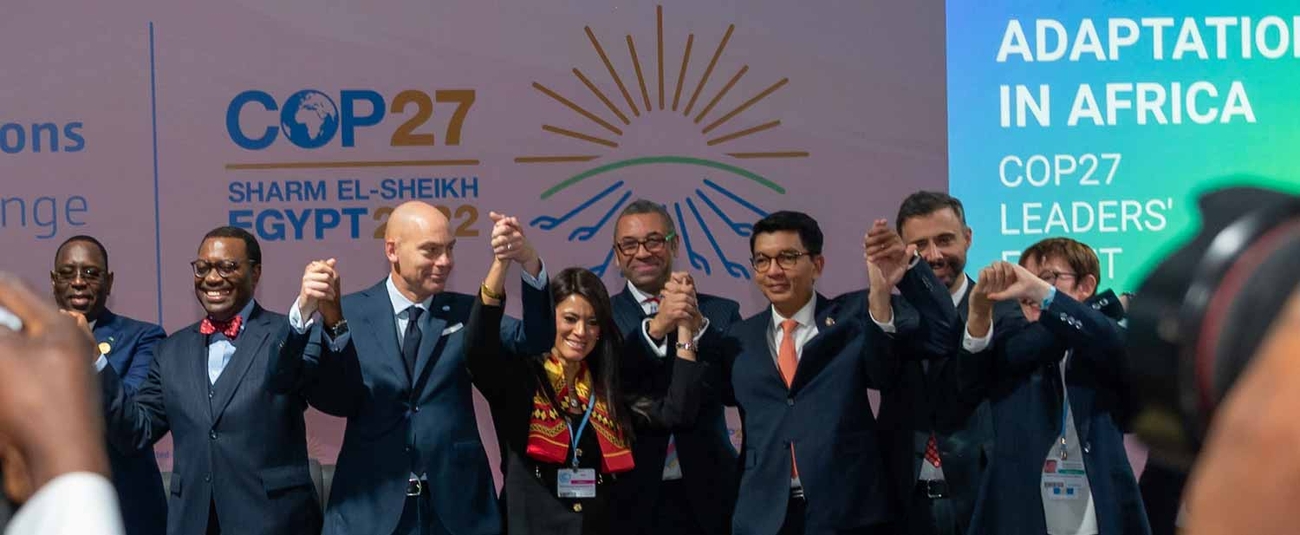
Global leaders on Tuesday rallied around climate adaptation for Africa. They attended the Africa Adaptation Leaders’ Event, convened by African Union Chair President Macky Sall of Senegal, Global Center on Adaptation CEO Patrick Verkooijen, and African Development Bank Group President Akinwumi Adesina.
The event took place at the global climate summit (COP27) in Sharm El-Sheikh, Egypt. It underscored the critical need for climate adaptation in Africa and responded to the call for the capitalization of the Africa Adaptation Acceleration Program (AAAP).
“This is a pivotal step in the fight against climate change,” African Union Chair President Macky Sall said. “The commitments made by Africa’s partners will give the Africa Adaptation Acceleration Program the boost that it needs to transform the development trajectory of the world’s most climate exposed continent. I am confident in the ability of the AAAP to deliver results for Africa.”
The Africa Adaptation Acceleration Program is an Africa-owned and Africa-led initiative developed by the Global Center on Adaptation (GCA) and the African Development Bank (AfDB) in close collaboration with the African Union. It serves as the implementation of the Africa Adaptation Initiative (AAI) to mobilize $25 billion to implement, scale and accelerate climate adaptation across the Africa. Since 2021, AAAP has mainstreamed climate adaptation in over$3.5 billion of investments in 19 countries.
United Nations Secretary-General António Guterres said: “I want to express my total solidarity for the Africa Adaptation Acceleration Program […] I urge the international community to support Africa to mobilize the technical & financial resources for scaling up transformative adaptation.”
“With this innovative program, Africa has developed a plan to grow, create jobs and opportunities for people, and to be resilient against the climate crisis,” said President Akufo-Addo of Ghana. “AAAP’s singular focus on the issue of climate adaptation will also contribute to greater stability and progress in Africa and around the world. AAAP is aligned with Ghana’s plans to address climate change as it chairs the Climate Vulnerability Forum (CVF) to lead efforts from the world’s most climate vulnerable countries to spur and mobilize investment through the Climate Prosperity Plans."
James Cleverly, Secretary of State for Foreign, Commonwealth and Development Affairs of the United Kingdom announced that the UK will provide £200 million to the African Development Bank’s Climate Action Window. This is in addition to the £20 million announced at COP26 in Glasgow to the AAAP Upstream Financing Facility.
Cleverly noted: “Climate change is having a devastating impact on countries in Sub-Saharan Africa facing drought and extreme weather patterns, which have historically received a tiny proportion of climate finance. This new mechanism […] will see vital funds delivered to those most affected by the impacts of climate change, much more quickly.”
Prime Minister Mark Rutte of the Netherlands followed through on the commitment made at the Africa Adaptation Summit held at the Global Center on Adaptation in September to confirm that the Netherlands will contribute EUR110 million to the AAAP, with EUR10 million in support for the Upstream Financing Facility hosted by GCA and EUR 100 million for the Climate Action Window of the African Development Fund at the African Development Bank as part of the Netherlands’ commitment to dedicate half of its climate funding, fully grant based, to climate adaptation, with a focus on Africa.
Norwegian Prime Minister Jonas Gahr Støre echoed African leaders’ calls for countries to rapidly scale up finance for climate adaptation, stating: “The climate crisis is here and now. Years of progress are at risk.”
“The AAAP Upstream Financing Facility is the delivery mechanism of adaptation and will use millions to leverage the billions that is required for adaptation,” he continued. “AAAP projects will generate effective climate adaptation outcomes. Adaptation is a growth agenda. A jobs agenda. And a prosperity agenda. On behalf of Norway, I am looking forward to continuing this partnership, investing in it, and supporting it with the Global Center on Adaptation.”
International Monetary Fund Managing Director Kristalina Georgieva emphasized the need to accelerate adaptation in Africa, stating: “It is paramount to support Africa’s adaptation because Africa will not reach its tremendous potential without it. AAAP complements the IMF’s Resilience and Sustainability Trust, which helps countries address external shocks such as climate change and ensure sustainable growth that can give Africa a chance to leapfrog outdated development models.”
African Development Bank Group President Dr. Akinwumi Adesina said: “Africa is suffering from the devastating effects of climate change. Our continent is being short changed by climate finance. The contributions towards the Africa Adaptation Acceleration Program’s Upstream Financing Facility and the Climate Action Window – which the African Development Bank manages – will help capitalize the program. With increased capital, we can better deliver the investment needed to bridge the adaptation finance gap. We want to ensure that the most vulnerable communities can benefit from a sustainable and prosperous future.”
Endorsing the outcomes of the high-level meeting, Patrick Verkooijen, CEO of the Global Center on Adaptation, closed with a statement emphasizing the AAAP’s impact to date, noting that “there is no pause button on the climate crisis. Africa must adapt to the threat of climate change, and it must adapt now.”
“Through the AAAP,” he continued, “Africa has charted its path towards a climate-resilient future for its youth, its economic growth, and for its prosperity.”
About the Global Center on Adaptation
The Global Center on Adaptation (GCA) is an international organization which works as a solutions broker to accelerate action and support for adaptation solutions, from the international to the local, in partnership with the public and private sector, to ensure we learn from each other and work together for a climate-resilient future. Founded in 2018, GCA is hosted by the Netherlands, working from its headquarters in Rotterdam with a knowledge and research hub based in Groningen. GCA has a worldwide network of regional offices in Abidjan, Côte d’Ivoire, Dhaka, Bangladesh and Beijing, China. Through this evolving network of offices and global and regional GCA teams, the organization engages in high-level policy activities, new research contributions, communications, and technical assistance to governments and the private sector.
About the African Development Bank
The African Development Bank Group is Africa’s premier development organization. Its overarching objective is to spur sustainable economic development and social progress in its regional member countries, thus contributing to poverty reduction across the continent.
The Bank Group achieves this objective by mobilizing and allocating resources for investment in African countries and providing policy advice and technical assistance to support development efforts.
In 2015, all multilateral development institutions agreed on the same set of objectives, the United Nations Sustainable Development Goals.
Learn more: https://www.afdb.org/
About the Africa Adaptation Acceleration Program
The Africa Adaptation Acceleration Program (AAAP) is a joint initiative of the African Development Bank and the Global Center on Adaptation (GCA). It aims to mobilize $25 billion, over five years, to accelerate and scale climate adaptation action across the continent. This ambition is delivered through the AAAP Upstream Financing Facility managed by the Global Center on Adaptation and the African Development Bank’s climate action window in the ADF replenishment. AAAP works across four pillars to achieve transformational results: Climate-Smart Digital Technologies for Agriculture and Food Security; African Infrastructure Resilience Accelerator; Youth Empowerment for Entrepreneurship and Job Creation in Climate Adaptation and Resilience and Innovative Financial Initiatives for Africa. AAAP has already guided over $3.5 billion of upstream investments in 19 countries with every dollar spent influencing $100 downstream.
COP27 - COP27 Leaders' Event, Accelerating Adaptation in Africa (DAY 2)
COP26 Leaders’ Event – Africa Adaptation Acceleration Summit
What: COP26 Leaders’ Event – Africa Adaptation Acceleration Summit
Where: Meeting room 4, Zone F (in front of plenary rooms)/ also available on livestream here: https://bit.ly/31nTtIW
When: 14:15-15:45 on Tuesday 2nd November
Followed by press conference
When: 16:00-16:30
Where: Press Conference Room Durdle Door, Area D - Ground Floor
The future of Africa depends on global action and firm resource commitments to support climate adaptation. The recent IPCCC report highlighted the continent is the most vulnerable to climate change. The Africa Adaptation Acceleration Summit is the moment at COP26 for African heads of state and government to outline how they are ready to play their part to build resilience across the continent. They will outline the commitments made and the actions required by global partners for a sustainable future.
Confirmed speakers
Host’s Keynote address
Félix Tshisekedi, President of the Democratic Republic of Congo and Chair of the African Union
Keynotes
- António Guterres, Secretary-General of the United Nations
- Bill Gates, co-Chair of the Bill & Melinda Gates Foundation
- Akinwumi Adesina, President of the African Development Bank Group
- Antony Blinken, U.S. Secretary of State
- Kristalina Georgieva, Managing Director of the International Monetary Fund
- Ngozi Okonjo-Iweala, Director-General of the World Trade Organization
- Alok Sharma, President for COP26
Leaders’ interventions
- João Lourenço, President of Angola
- Mokgweetsi Masisi, President of Botswana
- Évariste Ndayishimiye, President of Burundi
- Jorge Carlos Fonseca, President of Cape Verde
- Faustin-Archange Touadéra, President of Central African Republic
- Azali Assoumani, President of Comoros
- Adama Barrow, President of Gambia
- Nana Akufo-Addo, President of Ghana
- Umaro Mokhtar Embaló, President of Guinea Bissau
- Uhuru Kenyatta, President of Kenya
- Andry Rajoelina, President of Madagascar
- Lazarus Chakwera, President of Malawi
- Filipe Nyusi, President of Mozambique
- Mohamed Bazoum, President of Niger
- Muhammadu Buhari, President of Nigeria
- Paul Kagame, President of Rwanda
- Wavel Ramkalawan, President of Seychelles
- Julius Maada Bio, President of Sierra Leone
- Samia Suluhu Hassan, President of Tanzania
- Faure Gnassingbé, President of Togo
Moderation
Patrick Verkooijen, CEO of Global Center on Adaptation
COP27: UK triples its pledges for Africa’s climate adaptation projects
Millions pledged at Africa adaptation acceleration event
African, other world leaders gather for largest summit on climate adaptation at COP26
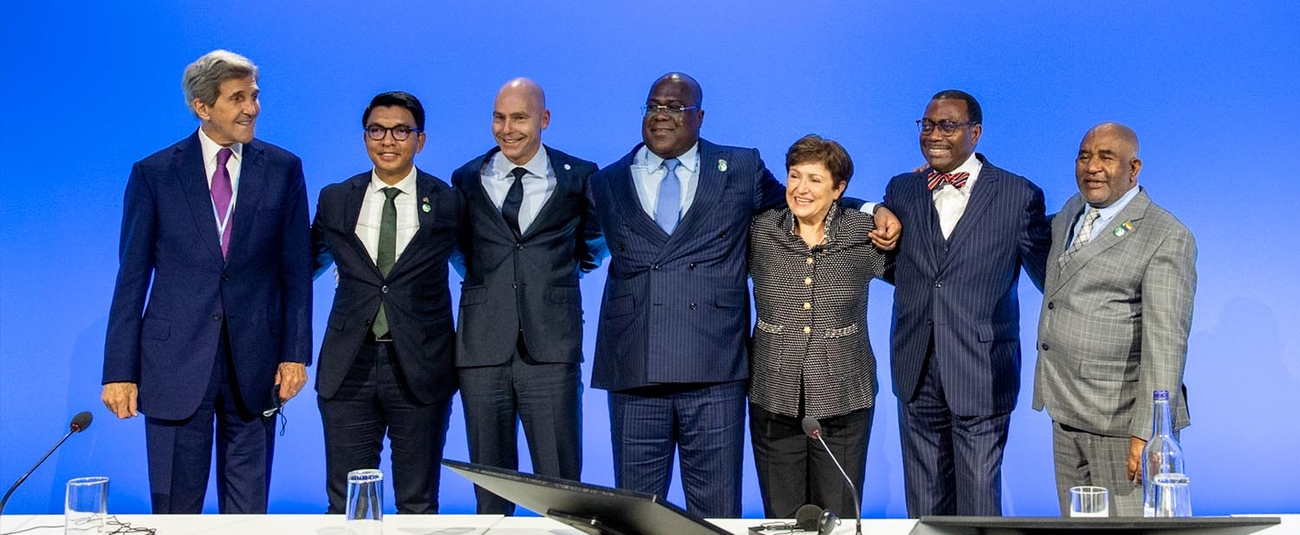
African and other global leaders came together at COP26 in Glasgow yesterday for the Africa Adaptation Acceleration Summit, the largest summit to date on climate adaptation.
The summit called for the rest of the world to ramp up its support for the African continent as it adapts to the adverse effects of climate change, including devastating human impacts in Madagascar, where 1.3 million people live under food distress following four years of no rain. Madagascar’s situation has been described as the first climate induced drought.
President Félix Tshisekedi of the Democratic Republic of Congo and Chairperson of the African Union led Tuesday’s event. He highlighted the $6 billion in financial commitments for climate adaptation that African countries had put forward in their nationally determined contributions (NDCs) and called for increased funding to produce the additional $27 billion a year that the continent requires.
President Tshisekedi said: “Adaptation finance flowing to Africa is grossly insufficient compared to the enormous resources needed for the continent to adapt to climate change. That is why African countries, working with the Global Center on Adaptation, the African Development Bank, and other partners, launched the Africa Adaptation Acceleration Program (AAAP). The program lies at the heart of Africa’s climate change needs. It is Africa-owned and Africa-led. African nations have endorsed it as Africa’s preferred mechanism to deploy adaptation finance for adaptation projects in Africa.”
African Development Bank Group President Dr Akinwumi A. Adesina said: “The Africa Adaptation Acceleration Program is a game changer for Africa to deliver results and impacts on adaptation, fast and at scale. It will support 30 million farmers with digital climate advisory services. The Technologies for African Agricultural Transformation program supported by the African Development Bank and the Bill and Melinda Gates Foundation has already delivered climate resilient technologies for 11.2 million farmers in just two years.”
He added: “With the Africa Adaptation Acceleration Program, we expect to reach 40 million farmers. We plan to support farmers in producing 100 million metric tons of food, which will be enough to feed 200 million people and reduce hunger by 80%.”
Moderating summit proceedings, Patrick Verkooijen, CEO of the Global Center on Adaptation, underscored the urgent need for accelerated climate adaptation action across the continent: “COP26 must deliver on the promises of Paris,” he said. “We are failing and we are failing Africa. We must bring more ambition and more finance to help Africa adapt to the pace of a climate emergency devastating the continent with increasingly serious consequences for the world’s poorest and most vulnerable,” the GCA CEO added.
COP26 President Alok Sharma announced $197 million in new funding for adaptation for Africa from the UK government. Of this amount, $27 million will support the Africa Adaptation Accelerated Program upstream facility to deliver technical assistance and a pipeline of bankable projects. The package is expected to unlock almost $1.2 billion for climate adaptation in Africa. Sharma said there will be more to come.
US Secretary of State Antony Blinken also announced new funding for climate adaptation from the United States government. He said the US President would work with the US Congress to dedicate $3 billion annually in adaptation finance by the year 2024. This is the largest commitment ever made by the US to reduce the impact of climate change in those most endangered by it around the world.
Global and African Leaders Welcome Launch of GCA Africa as “Historic Moment to Accelerate Adaptation” on the Continent
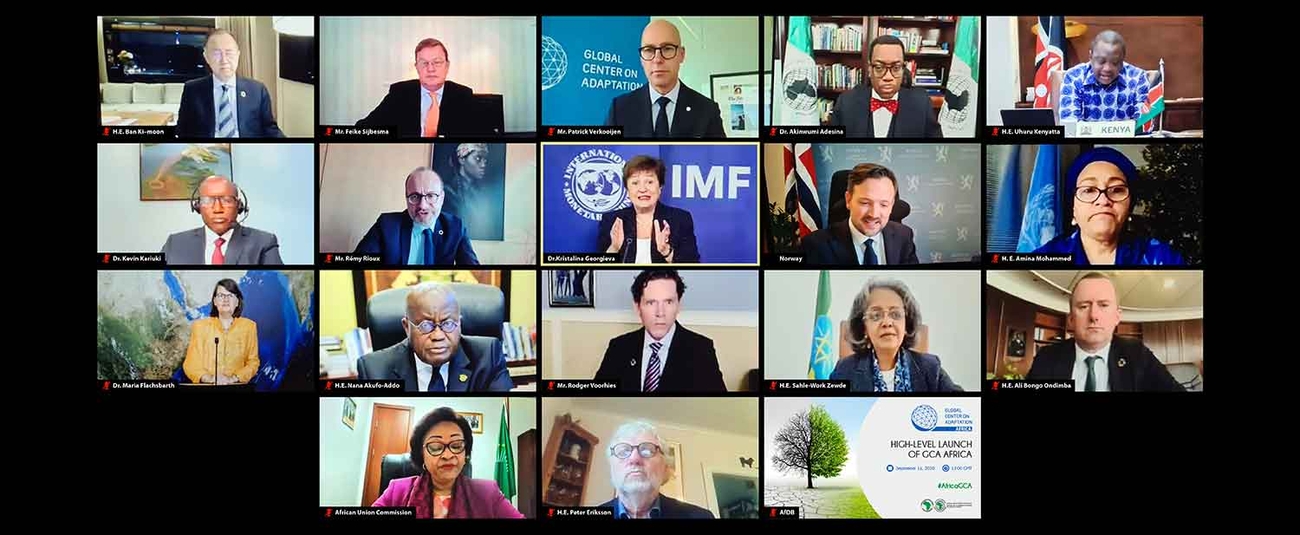
The Global Center on Adaptation today announced the launch of its regional office in Côte d’Ivoire.
Hosted by the African Development Bank at its headquarters in the Ivorian capital Abidjan, GCA Africa will work with partners across the continent to scale and accelerate adaptation action that protects African communities from the impacts of climate change.
GCA Africa will focus on programs and action, knowledge acceleration and capacity building and agenda-setting that respond to the acute challenges from the changing climate facing African countries.
The GCA Africa programs include improving the food security of one billion people in Sub-Saharan Africa by 2030 through a program on rural well-being and food security, as well as projects to support communities through water for urban growth and resilience; using nature for more resilient infrastructure; adaptation finance and building youth leadership.
Commenting on the launch, Ban Ki-moon, Co-Chair of the Board of the Global Center on Adaptation and 8th Secretary-General of the United Nations said:
“This is a historic moment to accelerate adaptation in Africa. Nowhere is the challenge of achieving sustainable development in the face of a changing climate more acute. Our new regional office will support regional and national adaptation efforts by emphasizing and spreading existing best practices on the continent and ensuring their fully fledged integration into broader international adaptation efforts”.
Dr. Akinwumi Adesina, President of the African Development Bank said:
“I am delighted with the launch today of the Global Center on Adaptation for Africa (GCA) hosted by the African Development Bank. The Bank has committed to doubling its financing for climate to $25 billion by 2025, with over 50% devoted to climate adaptation. Africa must not be short-changed by global climate finance. We will partner with the GCA to mobilize more resources for climate adaptation in Africa.”
Ali Bongo Ondimba, President of Gabon and Chair of the African Adaptation Initiative said:
“The devastating effects of climate change, which include severe droughts, floods, reduced agricultural yields, sea-level rise, and other climate-related disasters, are on the rise. The launch of GCA Africa is a bold and innovative initiative to galvanize the support needed to significantly scale up adaptation on the continent, identify gaps and connect regional partners to find solutions.”
Quotes from other partners:
Kristalina Georgieva, Managing Director, International Monetary Fund said:
“More than any other region, sub-Saharan Africa is vulnerable to the impact of climate change, which threatens lives and livelihoods and undermines economic growth. After the current crisis, boosting resilience is an urgent priority so it’s vital we share the knowledge and best practice that can help accelerate climate adaptation.”
Amina J. Mohammed, Deputy Secretary General of the United Nations said:
“There is an urgent need to step up the support for people in Africa, and around the world, affected by climate change. I welcome the Global Center on Adaptation Africa as a crucial partner in delivering the elevated ambition and enhanced action that is needed to make this shift towards a resilient future.”
Feike Sijbesma, Co-Chair of the Board of the Global Center on Adaptation and Honorary Chairman of Royal DSM said:
“Millions of lives depend on Africa’s agricultural sector. Adapting and improving its resilience to climate change is therefore a must. By investing in African local food systems we catalyze sustainable value chains and support the vulnerable but small-scale often female producers.”
Nana Akufo-Addo, President of Ghana said:
“Adaptation to the impact of our changing climate is essential if Ghana is to continue to grow and prosper. We look forward to working with GCA and its partners to meet the challenge of climate change and ensuring resilience is built into Africa’s economic recovery plans.”
Dag-Inge Ulstein, Minister of International Development for Norway said:
“Climate change is not only damaging for the environment, but devastating also for development. It is important that countries around the world, especially our partners in Africa, work together to address these global challenges. Norway is pleased to be able to support GCA Africa in accelerating this agenda.”
Peter Eriksson, Minister for International Development Cooperation for Sweden said:
“GCA is a key solutions broker and center of excellence with a holistic approach that aims to accelerate adaptation solutions for a climate-resilient future in Africa. By working with GCA Africa we will intensify climate adaptation efforts to ensure we integrate solutions to have a coherent response to our climate emergency.”
Patrick Verkooijen, CEO of the Global Center on Adaptation said:
“The impacts of climate change are already being felt across Africa and will only increase in magnitude. Adaptation is not a nice-to-have, it’s a necessity. Through our role as a solutions broker, GCA Africa will work closely with partners in every sector to ensure the most effective adaptation measures are shared and scaled across the continent, responding to the growing demand for strengthening resilience to the impacts of our changing climate.”
The launch of GCA Africa comes shortly after the launch of its South Asian office in Dhaka by Prime Minister Sheikh Hasina in September 2020. Its first regional office was launched in Beijing by Premier Li Keqiang in June 2019.
In May 2020, GCA Africa published a GCA policy brief(link is external), with the African Adaptation Initiative and endorsed by 54 Heads of State and Government, which recommended focusing stimulus investment in Africa on resilient infrastructure and food security to overcome the COVID-climate crisis.
The GCA is the lead partner institution for the Climate Adaptation Summit in the Netherlands – the first major gathering of international leaders dedicated entirely to adaptation. The summit takes place on 25 January 2021 and is hosted by Prime Minister Mark Rutte of the Netherlands. The GCA is also the Managing Partner to the Climate Vulnerable Forum and Vulnerable Twenty (V20) Group of Ministers of Finance, a group of 48 developing countries highly vulnerable to climate change.
Watch the launch at the following links:
About the Global Center on Adaptation
The Global Center on Adaptation (GCA) is an international organization which works as a solutions broker to accelerate action and support for adaptation solutions, from the international to the local, in partnership with the public and private sector, to ensure we learn from each other and work together for a climate resilient future. Founded in 2018, the GCA is hosted by the Netherlands. Through an evolving network of offices and global and regional GCA teams including a global innovation hub for climate adaptation launched by Premier Li Keqiang in Beijing, the organization engages in high-level policy activities, new research contributions, communications, and technical assistance to governments and the private sector.

